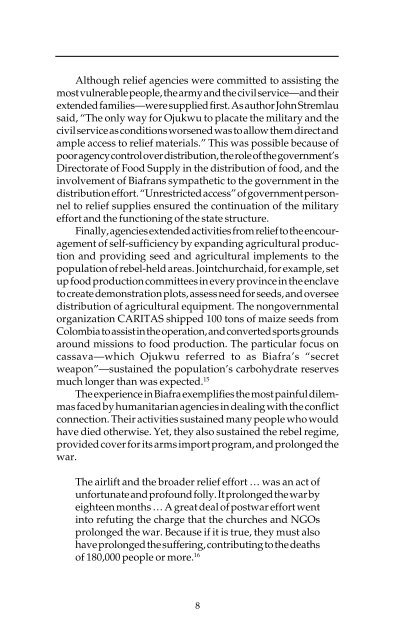Brown Cover OP 43 - The Watson Institute for International Studies
Brown Cover OP 43 - The Watson Institute for International Studies
Brown Cover OP 43 - The Watson Institute for International Studies
You also want an ePaper? Increase the reach of your titles
YUMPU automatically turns print PDFs into web optimized ePapers that Google loves.
Although relief agencies were committed to assisting the<br />
most vulnerable people, the army and the civil service—and their<br />
extended families—were supplied first. As author John Stremlau<br />
said, “<strong>The</strong> only way <strong>for</strong> Ojukwu to placate the military and the<br />
civil service as conditions worsened was to allow them direct and<br />
ample access to relief materials.” This was possible because of<br />
poor agency control over distribution, the role of the government’s<br />
Directorate of Food Supply in the distribution of food, and the<br />
involvement of Biafrans sympathetic to the government in the<br />
distribution ef<strong>for</strong>t. “Unrestricted access” of government personnel<br />
to relief supplies ensured the continuation of the military<br />
ef<strong>for</strong>t and the functioning of the state structure.<br />
Finally, agencies extended activities from relief to the encouragement<br />
of self-sufficiency by expanding agricultural production<br />
and providing seed and agricultural implements to the<br />
population of rebel-held areas. Jointchurchaid, <strong>for</strong> example, set<br />
up food production committees in every province in the enclave<br />
to create demonstration plots, assess need <strong>for</strong> seeds, and oversee<br />
distribution of agricultural equipment. <strong>The</strong> nongovernmental<br />
organization CARITAS shipped 100 tons of maize seeds from<br />
Colombia to assist in the operation, and converted sports grounds<br />
around missions to food production. <strong>The</strong> particular focus on<br />
cassava—which Ojukwu referred to as Biafra’s “secret<br />
weapon”—sustained the population’s carbohydrate reserves<br />
much longer than was expected. 15<br />
<strong>The</strong> experience in Biafra exemplifies the most painful dilemmas<br />
faced by humanitarian agencies in dealing with the conflict<br />
connection. <strong>The</strong>ir activities sustained many people who would<br />
have died otherwise. Yet, they also sustained the rebel regime,<br />
provided cover <strong>for</strong> its arms import program, and prolonged the<br />
war.<br />
<strong>The</strong> airlift and the broader relief ef<strong>for</strong>t … was an act of<br />
un<strong>for</strong>tunate and profound folly. It prolonged the war by<br />
eighteen months … A great deal of postwar ef<strong>for</strong>t went<br />
into refuting the charge that the churches and NGOs<br />
prolonged the war. Because if it is true, they must also<br />
have prolonged the suffering, contributing to the deaths<br />
of 180,000 people or more. 16<br />
8

















